仁爱七年级上u3上课复习用归纳 部分
仁爱英语七年级上册Unit3topic3知识点复习总结
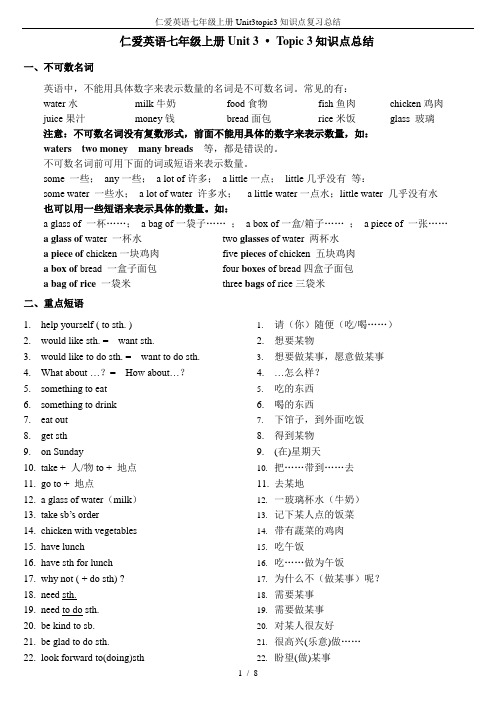
仁爱英语七年级上册Unit3topic3知识点复习总结仁爱英语七年级上册Unit 3 •Topic 3知识点总结一、不可数名词英语中,不能用具体数字来表示数量的名词是不可数名词。
常见的有:water水juice果汁milk牛奶money钱food食物bread面包fish鱼肉rice米饭chicken鸡肉glass 玻璃注意:不可数名词没有复数形式,前面不能用具体的数字来表示数量,如:waters two money many breads 等,都是错误的。
不可数名词前可用下面的词或短语来表示数量。
some 一些;any一些;a lot of许多;a little一点;little几乎没有等:some water 一些水;a lot of water 许多水; a little water一点水;little water 几乎没有水也可以用一些短语来表示具体的数量。
如:a glass of 一杯……;a bag of一袋子……;a box of一盒/箱子……;a piece of 一张……a glass of water 一杯水a piece of chicken一块鸡肉a box of bread 一盒子面包a bag of rice一袋米two glasses of water 两杯水five pieces of chicken 五块鸡肉four boxes of bread四盒子面包three bags of rice三袋米二、重点短语1.help yourself ( to sth. )2.would like sth. = want sth.3.would like to do sth. = want to do sth.4.W hat about …?= How about…?5.something to eat6.something to drink7.eat out8.get sth9.on Sunday10.take + 人/物to + 地点11.go to + 地点12.a glass of water(milk)13.take sb’s order14.chicken with vegetables15.have lunch16.have sth for lunch17.why not ( + do sth) ?18.need sth.19.need to do sth.20.be kind to sb.21.be glad to do sth.22.look forward to(doing)sth 1.请(你)随便(吃/喝……)2.想要某物3.想要做某事,愿意做某事4.…怎么样?5.吃的东西6.喝的东西7.下馆子,到外面吃饭8.得到某物9.(在)星期天10.把……带到……去11.去某地12.一玻璃杯水(牛奶)13.记下某人点的饭菜14.带有蔬菜的鸡肉15.吃午饭16.吃……做为午饭17.为什么不(做某事)呢?18.需要某事19.需要做某事20.对某人很友好21.很高兴(乐意)做……22.盼望(做)某事短语详解1.help yourself. 请(你)随便.help yourself to sth. 请(你)随便吃/喝……如:Help yourself to some fish. Tom. 汤姆,请随意吃些鱼肉。
仁爱版英语七上第Unit3知识点

Unit 3 Getting Together知识点复习Topic 1 Do you like English?Section A1. speak 讲、说(某种语言)E.g. He can speak English .2. Could you please + 动词原形?“您可以......吗?”/“请您……好吗?”(表请求)您可以告诉我你的名字吗?_________________________________________________________回答:Sure. / Of course. / No problem. 好的,没有问题。
Sorry. 不好意思,不行。
3. help sb. with sth. = help sb. (to) do sth.我经常帮助Jane学习汉语。
_______________________________________________________________=________________________________________________________________ 4. tell sb. sth. = tell sth. to sb. 告诉某人某事tell sb. about sth. 告诉某人关于某事请告诉我你的名字。
___________________________________=______________________________________ 你可以告诉我你的电话号码吗?______________________________________________________________ 5. come from=be from他们来自英国。
____________________________________=________________________________________你来自哪里?______________________________________=________________________________________ 简来自加拿大吗?___________________________________=_______________________________________ 肯定回答:______________________________ 否定回答:_______________________________6. 在英语句子中,如果主语是第三人称单数,那么在动词后加-SE.g.You like English . He likes English .变为疑问句和否定句时,加助动词does并把动词还原为原形:他不喜欢鸡蛋。
仁爱英语七年级上册Unit3知识点

仁爱英语七年级上册Unit3知识点Unit 3的主题是“School Life”,本单元主要涉及到有关学校的日常生活、学生与老师的互动以及学生应该如何做好自己的学习。
本文将围绕着这个主题,总结一下本单元的重点知识点。
一、日常词汇本单元中出现了许多与学校日常生活相关的单词和短语,比如:1. classroom ——教室2. teacher ——老师3. student ——学生4. desk ——书桌5. chair ——椅子6. backpack ——书包7. notebook ——笔记本8. textbook ——教科书9. pencil ——铅笔10. pen ——钢笔11. ruler ——尺子12. eraser ——橡皮擦13. sharpener ——削笔器14. blackboard ——黑板15. chalk ——粉笔16. whiteboard ——白板17. marker ——漆笔18. schoolbag ——书包以上这些单词都是学生们在学校中会用到的基础词汇,掌握这些单词对于学生们建立英语思维和提高听说读写能力都至关重要。
二、日常用语除了基础单词外,本单元也涉及到了众多学生们在日常生活中常常用到的问候语、寒暄语和交际用语。
例如:1. Good morning! ——早上好!2. How are you? ——你好吗?3. I'm fine, thank you. ——我很好,谢谢。
4. What's your name? ——你叫什么名字?5. My name is… ——我叫…6. Nice to meet you! ——很高兴见到你!7. Can you help me, please? ——你能帮我一下吗?8. Sure! ——当然可以!9. Thank you. ——谢谢你!10. You're welcome. ——不客气。
除此之外,本单元还涉及到了寻求帮助、表达谦恭和提出请求时的常用语句。
仁爱版英语七年级上册Unit3知识点总结

仁爱版英语七年级上册Unit3知识点总结Unit 3 Getting Together Topic 1 语言点一、单词短语1. in the same class 在同一班2.study … with… 与…一起学习…3.help sb with sth=help sb (to)do sth. 帮助某人做某事4. No problem 没问题5.Certaiinly=Of course =Sure 当然6.at home在家6.help each other 互相帮助/学习7.speak Chinese 讲汉语8.say(说具体内容)9.want to do sth. 想要做某事10.want sth 想要某物11.visit Beijing 参观北京11. in English 用英语12.live in+大地点居住在…13.live at+小地点居住在…二、句型1. May I do sth.? 我可以做某事吗?eg.May I study English with you? 我可以与你一起学习英语吗?2.Could you please do sth?请您…好吗?/请问可不可以…?eg.Could you please tell me your name?请问你可以告诉我你的名字吗?Sure. My name is LiHua 当然可以,我叫李华。
2. like … very much 非常喜欢… eg. I like apples very much 我非常喜欢苹果like … a little 有点喜欢… eg. I like apples a littl e我有点喜欢苹果not like … at all 一点也不不喜欢… eg. She doesn’t like apples at all 她一点也不喜欢苹果三、语法:(一) 一般现在时1.肯定句: We speak Chinese2.肯定句: Mike speaks English.否定句: We don't speak Chinese. 否定句: Mike doesn't speak English.一般疑问句: Do you speak Chinese? 一般疑问句: Does Mike speak English?回答: Yes, we do. No, we don't. 回答: Yes, he does. No, he doesn't.3.动词第三人称单数构成形式:见书本121页(二)代词主格代词:在句中当句子主语e.g. I have a good friend. He has a good friend.宾格代词: 在句中当动词的宾语或介词的宾语,形成动宾或介宾结构.Please call me Mike. (动宾) Give it (动宾) to me (介宾) . Help us find him. (动宾)人称代词排列顺序:(可记住口诀)you, he and I; we, you and they; he and she口诀:对你尊重you在前,谦虚礼貌I最后;我们人多力量大,we要排在you之前,they委屈垫在后;两性并列不平等,绅士风度放一边,he 在前she在后特殊情况:1. 为了强调某人称,或是出现在承认错误之类的句中时,应把第一人称的I,放在前。
新版仁爱版七年级英语上册Unit3Gettingtogether基础知识整理

新版仁爱版七年级英语上册Unit3 Getting together基础知识整理Unit 3 Topic1 English is widely spoken throughout the world.一. 重点单词foreign —foreigner busy—business—businessman communicate—communication impossible—possible twin—twins lay—laid—laid speak—speaker Europe—European tour—tourist—tourism power—powerful lead—leading--leader二·词组stick sth on sp. 把……贴在be ready for sth 为某事准备好了can’t wait to do sth 迫不及待做某事have a good chance to do sth 有一个好的机会去做某事throughout / all over the world 全世界from now on 从现在开始millions of 数以百万计的be pleased with 对。
感到满意pack one’s bags 打包行李on business 出差the night table 床头柜the official language 官方语言be similar to / be the same as / be different from和……相似和……一样和……不一样have trouble/difficulty (in) doing sth 做某事有困难ask sb for help 向某人求助explain (sth) to sb 向某人解释某事get along with sb 与某人相处be in trouble 处于麻烦中divide into…把……分成the largest number of people 最多数量的人mother tongue 母语the base language 基础语言international business 国际商业the world’s airlines 国际航空in many different fields of life 在生活的很多不同领域go abroad 出国play an important part in our lives 在我们生活中扮演重要角色a powerful country 一个强大的国家take the leading position in 在某方面处于领先地位encourage sb to do sth 鼓励某人做某事be popular with sb. 受某人的欢迎make great progress in doing sth 在某事上取得巨大的进步require sb to do sth 要求某人做某事in the rest of 在……的剩余部分regard…as…把……当做……三.重点句子1.I will be able to see more cartoon characters。
仁爱版七年级上册unit3 知识点
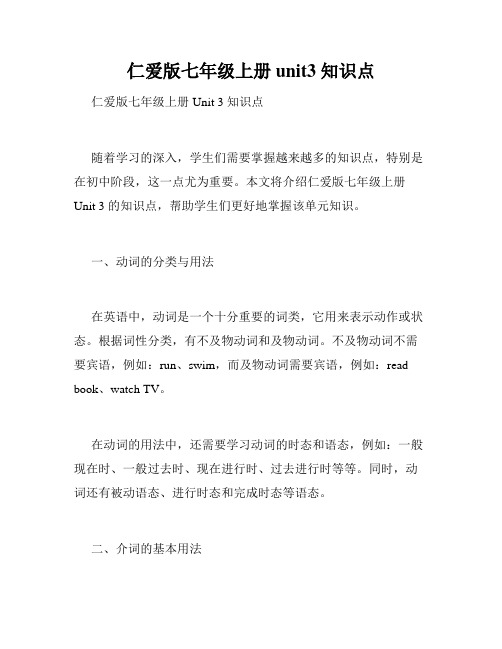
仁爱版七年级上册unit3 知识点仁爱版七年级上册Unit 3 知识点随着学习的深入,学生们需要掌握越来越多的知识点,特别是在初中阶段,这一点尤为重要。
本文将介绍仁爱版七年级上册Unit 3 的知识点,帮助学生们更好地掌握该单元知识。
一、动词的分类与用法在英语中,动词是一个十分重要的词类,它用来表示动作或状态。
根据词性分类,有不及物动词和及物动词。
不及物动词不需要宾语,例如:run、swim,而及物动词需要宾语,例如:read book、watch TV。
在动词的用法中,还需要学习动词的时态和语态,例如:一般现在时、一般过去时、现在进行时、过去进行时等等。
同时,动词还有被动语态、进行时态和完成时态等语态。
二、介词的基本用法介词是一个连接词,用来表示两个词之间的关系,例如:onthe table、under the chair。
介词的基本用法包括表示时间、地点、方式等。
在使用介词时,需要注意介词与后面的名词或代词之间的正确搭配,例如:in the morning、at night、on the bus等等。
三、数词的用法数词是表示数量的词,包括基数词、序数词和分数词。
其中,基数词用来表示数量的多少,例如:one、two、three;序数词用来表示位置,例如:first、second、third;分数词用来表示分数,例如:one third。
在使用数词时,需要注意其在句子中的位置和拼写形式。
例如:I have two cats、He is the first in the race、One half is equal to two quarters。
四、特殊疑问句特殊疑问句是用来询问特定信息的问句,例如:What’s your name?、Where do you live?、Who is your teacher?、How do you feel?、When is your birthday?、Why do you like English?。
仁爱英语七年级上册unit3topic3知识总结

仁爱英语七年级上册unit3topic3知识总结第一篇:仁爱英语七年级上册unit3topic3知识总结Unit3.Topic3.What would you like to drink?一.核心词汇yourself would fish chicken about rice drink juice milk for idea water vegetable bread hamburger usually breakfast lunch supper food may take order sir something glass wait moment let well eat out dinner why dear kind be 二.常用词组help oneself(to)would like what about…… all right good idea take one’s order something to drink/eat a glass of wait a moment eat out have dinner why not….here you are such as 三.重点句子 Would you like some eggs, Maria? Yes, please.No, thanks.I’d like some chicken.What about you, Jane? W hat would you like to drink? What do you usually have for breakfast, Michael? Would you like something to eat/drink? Would you like to have dinner with me? Yes, I’d like to.They are all kind to me.四,交际用语Help yourselves/yourself(to some fish).Milk for me, please.May I take your order,sir? Wait a moment,please.May I help you,sir? Let me see.Why not have some fish and eggs? Good idea.Here you are.I’ m very glad to be here.五.语法精粹 would like 句型 I would like an egg and some fish.Would you like some vegetables? What would you like to eat? Countable nouns and uncountable nous 六.其他学习辅音音标 /h/ /r/ /w/ /j/ 七.金点剖析1.Help yourselves!请随便(吃/喝)。
仁爱英语七年级上册Unit 3 重点归纳
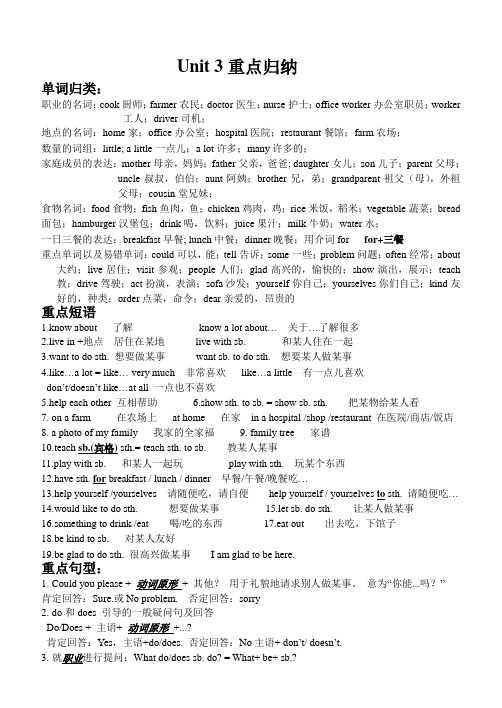
Unit 3重点归纳单词归类:职业的名词:cook厨师;farmer农民;doctor医生;nurse护士;office worker办公室职员;worker 工人;driver司机;地点的名词:home家;office办公室;hospital医院;restaurant餐馆;farm农场;数量的词组:little; a little一点儿;a lot许多;many许多的;家庭成员的表达:mother母亲,妈妈;father父亲,爸爸; daughter女儿;son儿子;parent父母;uncle叔叔,伯伯;aunt阿姨;brother兄,弟;grandparent祖父(母),外祖父母;cousin堂兄妹;食物名词:food食物;fish鱼肉,鱼;chicken鸡肉,鸡;rice米饭,稻米;vegetable蔬菜;bread 面包;hamburger汉堡包;drink喝,饮料;juice果汁;milk牛奶;water水;一日三餐的表达:breakfast早餐; lunch中餐;dinner晚餐;用介词for for+三餐重点单词以及易错单词:could可以,能;tell告诉;some一些;problem问题;often经常;about 大约;live居住;visit参观;people人们;glad高兴的,愉快的;show演出,展示;teach 教;drive驾驶;act扮演,表演;sofa沙发;yourself你自己;yourselves你们自己;kind友好的,种类;order点菜,命令;dear亲爱的,昂贵的重点短语1.know about 了解know a lot about…关于…了解很多2.live in +地点居住在某地live with sb. 和某人住在一起3.want to do sth. 想要做某事want sb. to do sth. 想要某人做某事4.like…a lot = like… very much 非常喜欢like…a little 有一点儿喜欢don’t/doesn’t like…at all 一点也不喜欢5.help each other 互相帮助6.show sth. to sb. = show sb. sth. 把某物给某人看7. on a farm 在农场上at home 在家in a hospital /shop /restaurant 在医院/商店/饭店8. a photo of my family 我家的全家福9. family tree 家谱10.teach sb.(宾格) sth.= teach sth. to sb. 教某人某事11.play with sb. 和某人一起玩play with sth. 玩某个东西12.have sth. for breakfast / lunch / dinner 早餐/午餐/晚餐吃…13.help yourself /yourselves 请随便吃,请自便help yourself / yourselves to sth. 请随便吃…14.would like to do sth. 想要做某事15.let sb. do sth. 让某人做某事16.something to drink /eat 喝/吃的东西17.eat out 出去吃,下馆子18.be kind to sb. 对某人友好19.be glad to do sth. 很高兴做某事I am glad to be here.重点句型:1.Could you please + 动词原形+ 其他?用于礼貌地请求别人做某事。
仁爱版七年级上册Unit3知识点复习

visit sb./sp. 5)互相
each other 6)让某人做某事
let sb. do sth. 7)为什么不做某事?
Why not do sth?
8)在医院里
构词法——词根词缀法
v.+-er/-or
te教ach w工o作rk
f种ar田m + -er/-or
d开ri车ve 扮ac演t
n.
tea老c师her wo工r人ker fa农rm民er d司riv机er a演ct员or
可数名词&不可数名词
• 可数名词[C]:能以数目来计算,可以分成个体的人或 东西。
in a hospital 9)因病住在医院里
in hospital 10)去上学
go to school 11)去学校
go to the school 12)请随便吃/喝...
help oneself to... 13)想要做某事
would like to do sth.= want to do sth. 14)你能做...吗?
2.以o, s, x, ch, sh 结尾的加es e.g. watch—watches , wash—washes,box—boxes, do—does
3. 以辅音字母加 y 结尾的,去y变 i 加es e.g. dry—dries, fly—flies
4. 特殊情况 e. g. have– has
• apple/banana/egg/hamburger/vegetable... • 不可数名词[U]:不能以数目来计算,不可以分成个体
3仁爱英语七年级-上Unit-3-Topic-1--3知识点归纳及提升练习

Unit 3 Topic 1重点句型。
1.----Excuse me, could you please tell me your name?---Sure.2. Please tell Maria about it.3. Please give this letter to Maria.4. Could you ask her to call me back this evening? –Sure.5. He can speak some English.6. ---What does he say in the letter?---He wants to visit Beijing.7. ---Could you help me with my English?---Sure. /No problem.8. My pen pal can speak English very well.9. ---Who is the letter from? ---It’s from my pen pal, Sam.10. ----Does he live in England? ---Yes, he does.11. He knows a lot/a little/much about China.12. Many students in our class like English a lot, but I like it a little.13. We are good friends and we help each other.14. ---Do you like Chinese?---Yes, I like it very much/a little/ a lot./No, I don’t like it at all.一、单词1.for short简称2. in the same class 在同一班3.study … with… 与…一起学习… 3.very much 非常4. No problem 没问题5.Of course =Sure 当然15.at home在家6.help"study each other 互相帮助/学习7.learn from one another互相学习8.pen pal笔友9.speak Chinese 讲汉语 10.want to do sth. 想要做某事 11.visit the Great Wall 参观长城12. in English 用英语 13. be helpful to… 对…有帮助 14.at the English corner 在英语角二、句型:1. May I do sth.? 我可以做某事吗?e.g. : May I know"have"ask your name?May I study English with you?May I call you Mike?2.Could you please tell me your name?你可以告诉我你的名字吗?Sure. My name is …当然可以,我叫……2. like … very much " a lot 非常喜欢……like … a little 有点喜欢…not like … at all 根本不喜欢……not like … very much 不是很喜欢……三、语法:(一) 一般现在时1.肯定句: We speak Chinese否定句: We don't speak Chinese.一般疑问句: Do you speak Chinese?回答: Yes, we do. No, we don't.2.肯定句: Mike speaks English.否定句: Mike doesn't speak English.一般疑问句: Does Mike speak English?回答: Yes, he does. No, he doesn't.第二部分基础知识运用(55分)Ⅰ.单项选择。
七年级仁爱版unit3知识点总结

七年级仁爱版unit3知识点总结七年级的学习生涯可以说是对中学基础知识进行各方面的系统化学习,Unit3作为其中的一部分,承载了一定的英语知识点。
那么今天就由我来为大家总结一下Unit3中需要掌握的英语知识点。
一、词汇1.人称代词如:I,you,he,she,it,we,they2.动词如:be动词(变化)am,is,are;do动词一般现在时(变化)do,does;don't和doesn't是否定形式;现在分词;过去式;过去分词(变化);否定式(变化)3.形容词比较级,最高级4.其他如:a little,a few等等二、语法1. be动词的肯定、否定和疑问句如:肯定句:My mother is a teacher.否定句:My mother is not a teacher.疑问句:Is your mother a teacher?2. 有/没有如:Do you have a pen?/Do you have any brothers or sisters?3. 一般现在时的构成及其肯定、否定、疑问句形式如:构成:主语+动词原形肯定句:I like music.否定句:I don't like music.疑问句:Do you like music?4. 形容词比较级和最高级比较级如:good-better,bad-worse 等最高级如:good-the best,bad-the worst 等5. 特殊疑问词及其用法如:what,who,how,when,where,why 等等三、听力1. 听力中的基础提问如:Who is the boy in the picture?2. 听力中的基础描述如:This is a big house with a garden and a swimming pool.四、口语和阅读1. 熟悉Unit3的所有单词和短语如:grandfather,grandmother,cousin,uncle,aunt 等等2. 大声朗读教材中的文章如:Unit3 Part A 1a-2d3. 写作写一篇简短的英文日记,描述自己最近的生活,并描写家里的极简状况。
Unit3基础知识复习 仁爱版英语七年级上册

学 生教 师 上课内容 七年级上册Unit 3复习学 科英 语 第( )课时 年 级七年级 上课时间Unit 3课堂教学知识点一、语法(一)人称代词:主格和宾格单数 复数 中文 我 你 他 她 它 我们 你们他/她/它们主格 宾格用法规则:1)___________________________________ 2)___________________________________(二)1. 实意动词肯否疑2. 询问职业和工作场所1)询问工作:___________________________________________________ 2)询问工作场所:_______________________________________________(三)名词 1. 可数名词1)可数名词单数(a/an )2)可数名词复数(变化规则)①_______________________________________________ ②_______________________________________________ ③_______________________________________________ ④_______________________________________________ ⑤_______________________________________________ 2. 不可数名词1)常见的不可数名词:________类 1.________ 鱼肉 2.________ 鸡肉 3.________ 肉________类1.________ 水2. ________ 果汁3.________ 牛奶4.________ 可乐 其他1.________ 面包2. ________ 米饭3.________ 头发4.________ 食物5. ________ 巧克力6. ________ 时间7. ________ 家庭作业2)特点:①无_______________②谓语动词用___________形式(一般用be 动词_____) 1. 量词主语:非单三主语:单三肯定句: 否定句: 一般疑问句: 肯定回答: 否定回答:特殊疑问句结构:1)基本结构:____________________________________________________2)量词做主语时,谓语动词的形式__________________________________2.修饰词some/any; many/much1)some用于_________和_____________ (表请求和建议:_________________________________________________) any用于________和__________;2)many修饰_____________;much修饰______________;二、灵活运用1. speak/say/※※※tell1)speak+______________; 例:________________________ 讲/说些中文2)say+_________________; 例:他在信里说什么了?__________________________________________3)区别:speak English 和say it in English4)※※※ tell词组:tell sb. about sth. 告诉某人某事;tell sb. to do sth.告诉某人去做某事2.________________________________早/午/晚餐吃什么例1:我早餐通常吃牛奶和面包。
仁爱七年级上Unit 3知识点复习总结
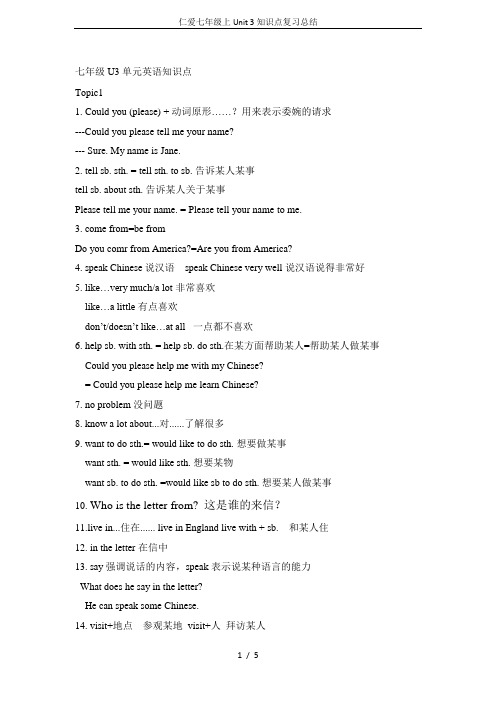
七年级U3单元英语知识点Topic11. Could you (please) + 动词原形……?用来表示委婉的请求---Could you please tell me your name?--- Sure. My name is Jane.2. tell sb. sth. = tell sth. to sb. 告诉某人某事tell sb. about sth. 告诉某人关于某事Please tell me your name. = Please tell your name to me.3. come from=be fromDo you comr from America?=Are you from America?4. speak Chinese说汉语speak Chinese very well说汉语说得非常好5. like…very much/a lot非常喜欢like…a little有点喜欢don’t/doesn’t like…at all 一点都不喜欢6. help sb. with sth. = help sb. do sth.在某方面帮助某人=帮助某人做某事Could you please help me with my Chinese?= Could you please help me learn Chinese?7. no problem没问题8. know a lot about...对......了解很多9. want to do sth.= would like to do sth. 想要做某事want sth. = would like sth. 想要某物want sb. to do sth. =would like sb to do sth. 想要某人做某事10. Who is the letter from? 这是谁的来信?11.live in...住在...... live in England live with + sb. 和某人住12. in the letter在信中13. say强调说话的内容,speak表示说某种语言的能力What does he say in the letter?He can speak some Chinese.14. visit+地点参观某地visit+人拜访某人15. many+名词复数many students16. each other 相互 help each other17. in the same class在同一个班18. good形容词a.用在系动词之后The boy is good.b. 用在名词前He is a good boy.well 副词常用来修饰动词He can speak Chinese well.19. a lot of+可数名词复数/不可数名词,常用于肯定句中20. some of them 他们中的一些21. every day 每天Topic21.be home 在家;到家at home在家I am home. 我到家了。
仁爱英语七年级上册Unit 3知识点总结归纳
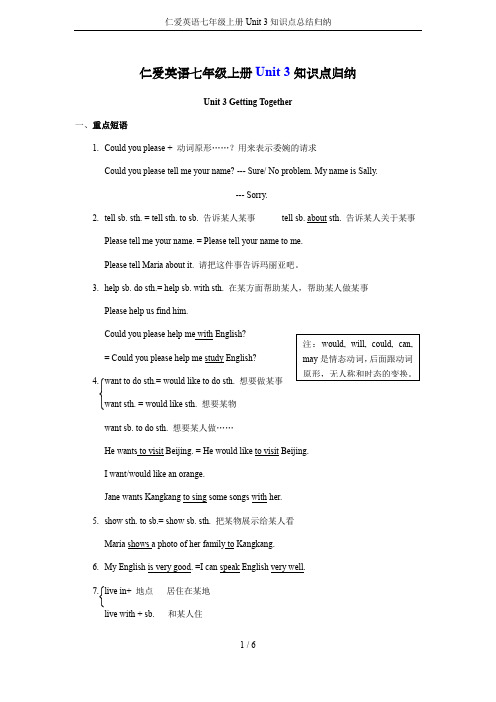
仁爱英语七年级上册Unit 3知识点归纳Unit 3 Getting Together一、重点短语1.Could you please + 动词原形……?用来表示委婉的请求Could you please tell me your name? --- Sure/ No problem. My name is Sally.--- Sorry.2.tell sb. sth. = tell sth. to sb. 告诉某人某事tell sb. about sth. 告诉某人关于某事Please tell me your name. = Please tell your name to me.Please tell Maria about it. 请把这件事告诉玛丽亚吧。
3.help sb. do sth.= help sb. with sth. 在某方面帮助某人,帮助某人做某事Please help us find him.Could you please help me with English?= Could you please help me study English?4.want to do sth.= would like to do sth.想要做某事want sth. = would like sth. 想要某物want sb. to do sth. 想要某人做……He wants to visit Beijing. = He would like to visit Beijing.I want/would like an orange.Jane wants Kangkang to sing some songs with her.5.show sth. to sb.= show sb. sth. 把某物展示给某人看Maria shows a photo of her family to Kangkang.6.My English is very good. =I can speak English very well.7.live in+ 地点居住在某地live with + sb. 和某人住He live in China with his parents.8.know a lot about……知道许多关于……的事He knows a lot about China.9.say表示说话的内容,speak表示说某种语言的能力What does he say in the letter?He can speak some English.10.对事物的喜欢程度like……very much/a lot非常喜欢like……a little 有点喜欢w W w . x K b 1.c o Mdon’t like……at all 一点都不喜欢Many students in our class like English a lot, but I like it a little.He doesn’t like chocolate at all.11. a lot=very much 许多a lot of+可数名词复数/不可数名词I have a lot of English books. These books help me a lot with my English.12.every day 每天each other 相互some of them他们中的一些eat out 下馆子,到外面吃饭13.play with sb. 和某人一块玩耍like to do/doing sth. 喜欢(做)某事She likes to play with Kitty.14.Help yourself/yourselves to sth. 随便吃(喝)……15.be kind to sb. 对某人很友好They are all kind to me. 他们对我很友好。
(完整)仁爱七年级上册Unit3知识点归纳和练习,文档

第三单元知识点归纳1、Could you 〔please〕〔后接动词原形〕你愿意做某事吗?May I〔后接动词原形〕我能做某事吗?2、the English corner英语角3、live in + 地点住在某地live with + 人和某人住在一起4、What does he say in the letter?他在信里说了些什么?What does he say on the photo?他在里说了些什么?5、 a lot = very much 放在句末,修饰动词,特别例: I like the boy a lot/ very much.not at all一点也不例: I don’ t like the boy at all..6、each other 相互,相互students often talk to each other in class.7、do sth with sb和某人一起做某事8、No problem没问题9、speak + 语言说某种语言speak English speak Chinese10、the Great Wall 长城11、come/go to + 地点去某地但 home 、 here 、 there这些是副词,前面不能够加 to例: go home / come here / go therego to do sth去做某事例:They go to play basketball.12、 like doing sth喜欢做某事like to do sth想要做某事13、It ’ s + adj +to sb对某人来说是的14、help sb with sth =help sb (to) do sth帮助某人某事15、be at home = be in在家go home 回家get home 到家in one’ s home在某人的家里16、have a seat / take a seat / sit down请坐下17、office worker办公室职员cook厨师cooker 炊具18、on a farm在农场上on the sofa在沙发上19、 a photo of one’ s family某人的全家照Family Tree 家谱(首字母都大写 )20、in a hospital 在医院〔纯属地点看法〕in hospital 因病住院例:He is ill in hospital.他生病住院He is in a hospital.他在医院里 (不必然是因为生病抵达医院 )21、look after sb = take care of sb照顾某人22/teach sb sth= teach sth to sb教某人某东西teach sb to do sth 教某人做某事21、help oneself ( to sth. )请任意〔吃〕help yourself/ yourselves (to fish)22、I ’ d like sth=I would like sth.我想要24、Would like to do sth = want to do sth想要做某事25、Would you like something to eat (drink)?你想要一些吃〔喝〕的东西吗?to eat 或 to drink修饰 something,作为后置定语。
仁爱英语七年级上Unit3知识复习总结
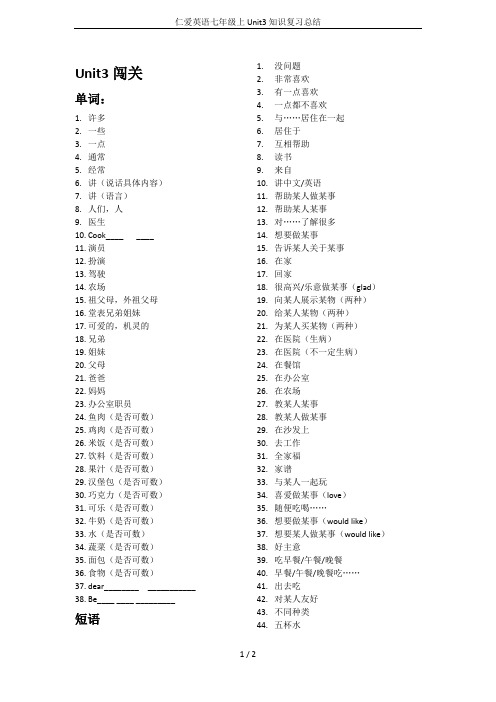
Unit3闯关单词:1.许多2.一些3.一点4.通常5.经常6.讲(说话具体内容)7.讲(语言)8.人们,人9.医生10.Cook____ ____11.演员12.扮演13.驾驶14.农场15.祖父母,外祖父母16.堂表兄弟姐妹17.可爱的,机灵的18.兄弟19.姐妹20.父母21.爸爸22.妈妈23.办公室职员24.鱼肉(是否可数)25.鸡肉(是否可数)26.米饭(是否可数)27.饮料(是否可数)28.果汁(是否可数)29.汉堡包(是否可数)30.巧克力(是否可数)31.可乐(是否可数)32.牛奶(是否可数)33.水(是否可数)34.蔬菜(是否可数)35.面包(是否可数)36.食物(是否可数)37.dear________ ___________38.Be____ ____ _________短语1.没问题2.非常喜欢3.有一点喜欢4.一点都不喜欢5.与……居住在一起6.居住于7.互相帮助8.读书9.来自10.讲中文/英语11.帮助某人做某事12.帮助某人某事13.对……了解很多14.想要做某事15.告诉某人关于某事16.在家17.回家18.很高兴/乐意做某事(glad)19.向某人展示某物(两种)20.给某人某物(两种)21.为某人买某物(两种)22.在医院(生病)23.在医院(不一定生病)24.在餐馆25.在办公室26.在农场27.教某人某事28.教某人做某事29.在沙发上30.去工作31.全家福32.家谱33.与某人一起玩34.喜爱做某事(love)35.随便吃喝……36.想要做某事(would like)37.想要某人做某事(would like)38.好主意39.吃早餐/午餐/晚餐40.早餐/午餐/晚餐吃……41.出去吃42.对某人友好43.不同种类44.五杯水45.需要做某事46.盼望做某事47.携带某物48.到达某地49.去某地50.去动物园51.在周日52.与某人共进晚餐53.去那里54.来这里55.在这里句子1.打扰一下,你能告诉我你的名字吗?2.他来自美国吗?(两种方式表达)3.他来自哪里?(两种方式表达)4.他来自美国(两种方式)5.李想的笔友中文讲得好6.你能帮助我学习中文吗?7.信来自谁?8.他对中国了解很多。
七年级上册仁爱英语u3知识点
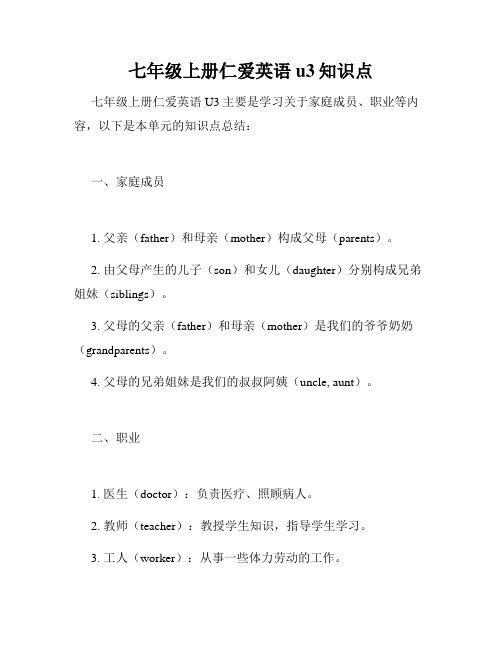
七年级上册仁爱英语u3知识点七年级上册仁爱英语U3主要是学习关于家庭成员、职业等内容,以下是本单元的知识点总结:一、家庭成员1. 父亲(father)和母亲(mother)构成父母(parents)。
2. 由父母产生的儿子(son)和女儿(daughter)分别构成兄弟姐妹(siblings)。
3. 父母的父亲(father)和母亲(mother)是我们的爷爷奶奶(grandparents)。
4. 父母的兄弟姐妹是我们的叔叔阿姨(uncle, aunt)。
二、职业1. 医生(doctor):负责医疗、照顾病人。
2. 教师(teacher):教授学生知识,指导学生学习。
3. 工人(worker):从事一些体力劳动的工作。
4. 商人(businessman):经商、做生意以盈利为目的的人。
5. 运动员(athlete):以参加各种体育比赛赢得胜利为目的的人。
6. 音乐家(musician):以演奏或创作音乐为主要职业的人。
三、情态动词1. can - 表示“能够、会”,一般用于肯定句。
例:I can play guitar very well.(我弹吉他很好。
)2. cannot/ can't - 表示“不能、不会”,一般用于否定句。
例:I can't speak French.(我不会说法语。
)3. must - 表示“必须、一定要”。
例:I must finish my homework before I go to bed.(我必须要在睡觉前完成作业。
)4. should - 表示“应该、应当”,用于建议或者表达主观意见。
例:You should go to bed early tonight.(今晚你应该早点睡觉。
)以上就是七年级上册仁爱英语U3的知识点总结,希望能够帮助同学们更好地学习和掌握英语知识。
